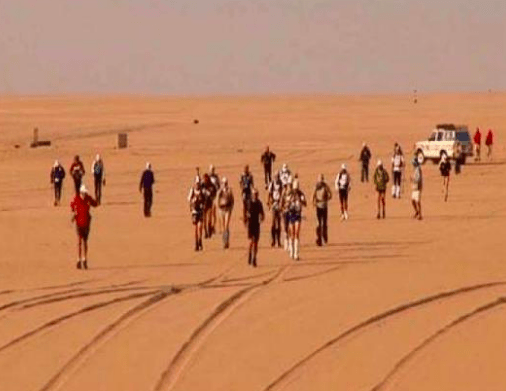What causes very sore feet during a long run? How to alieve or prevent some of the pain.
A certain amount of pain is normal during a long run, the pounding the musculoskeletal system is taking and especially the feet and the amount of hours and the increased blood flow to the area make it unavoidable to a degree however, there are some things to consider that can help avoid the worst of it or it lessen the pain afterwards.
1. Make sure your shoes are the right size. Sounds obvious right but beware when you go to buy shoes in a running shop your feet won't be swollen and full of blood from running so they will be in effect smaller than after a massive run. My feet swell during a long ultra up to two whole sizes so I make sure i buy shoes big enough for the race I am doing. Its especially important if I am heading to a hot desert race where the swelling is worse than in a local trail event. Typically I have a training shoe that is one size bigger than my street shoes and for deserts or particularly hot events I have another pair that is two tot he two and a half sizes bigger.
The consequences of shoes that end up too small for you can be horrendously painful both with pressure points and blisters but can also cut circulation to the Tibialis anterior and cause inflammation which can feel a bit like bad shin splints.
Another tip I picked up from an old time runner while running a 338km race in Germany was to make sure my shoe laces are very loose around the top of the ankle when doing long events (unless on muddy or tricky trails) the advice came too late for my shins which meant 3 weeks of crutches after the event and a hell of a lot of pain during it.
2. Stretch and strengthen the muscles in your feet and lower legs. While you are sitting watching tv at night massages and squeeze your feet. Getting your fingers into the spaces between the bones leading to the toes to relieve the pressure, massaging the arch and pulling and prodding everywhere to loosen up the poor overworked little muscles. If you a partner you can con into a foot massage even better or I am lucky enough to have one of those machines that use infrared and vibration on the feet to do this and that is phenomenal after a long run. It helps get rid of the lactic acid build up in the muscles and get the blood flowing back up the body and flushing it through. Fantastic bit of equipment for your home rehab if you can get one.
Stretch as well the calf complex and achilles and kneel on your feet and rock back to get a stretch across the top of the foot. Just a little care and attention is all they need.
3. Buid your mileage up consistently and slowly not in jumps. Don't increase your total mileage by more than 10% per week is a good rule of thumb.
4. Make sure you are well rested before you do your long run of the week. Take it easy the day before and make sure your core muscles are ready to support you and you can maintain good form. If you go into the run with sore tired core or glutes or hamstrings this can lead to poor form during your long run and your kinetic chain will be affected including how your feet land and this can lead to not only sore feet but injuries as well.
5. Strengthen your core and hips. This is the most crucial part of your body as a runner. Stability throughout your core and your hips is probably the single most important thing you can do to avoid injury as a runner who wants longevity in the sport. Don't just train your six pack either its about all muscles from your diaphragm to your pelvic floor and around the sides and lower back that is the what we refer to as your core. There are also many hip strengthening exercises that will help you be stable when you are running and improve your form and that will help get your glutes, some of the most powerful and largest muscles in the body.
6. Walk/ run combinations during long runs are a good way to increase your mileage and ability to go far without smashing your legs. Walking is an underestimated form of training especially for long distance or ultra runners or those staring out on their health and fitness programme. I still use walk/run combinations and in fact most ultras include at least to some degree and often a large degree a portion of walking. Training those muscles is also important.
7. Ice or cold water baths after a long run are a great way to reduce the inflammation as are compression tights and elevating your legs. There is some controversy around this but I swear by it.
8. Good socks ones that wick the moisture away from the feet and that dry quickly and don't cause a lot of heat from friction are important. Chafing creams and good blister care are also important.
9. Losing weight if you are overweight also helps but of course that is its own topic.
